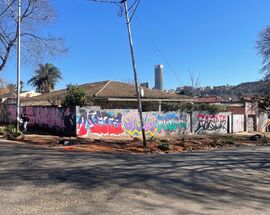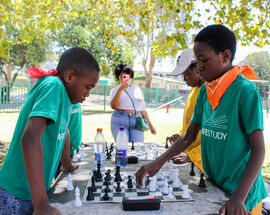To find out more about the work they are doing, we went for a tour of the area and met up with Makers Valley co-CEO Hector Mgiba.

and tackling the epidemic of illegal dumping. Photo: Makers Valley.
A shifting neighbourhood
The neighbourhoods of Makers Valley, so named for the artists, gardeners, carpenters, and other creative entrepreneurs in the area, huddle in the valley where the Jukskei River emerges. Plane trees, which turn brown in Joburg's dry winters, line the criss-cross streets. Amongst the oldest areas in Joburg, the buildings are an eclectic mix of styles and eras, from squat pre-fabs and the classic corrugated iron-roofed stoeps to hunkering silver warehouses.Once home to small-plot farms for mining magnates, the area was then home to a large Portuguese community, who left in the early 1990s after Apartheid laws were scrapped. With falling property prices and a general disdain for the inner-city and its surrounds by both business and wealthier residents who left in numbers, the area was redlined by banks, and owners abandoned their properties unable to sell them. At the same time, there was an influx of primarily working-class individuals from a diverse mix of ethnicities coming to the area to be closer to jobs.
The combination of this influx, combined with houses being abandoned, resulted in people squatting, buildings being hijacked by slumlords and overcrowding. These challenges remain prevalent in the area, and the lack of formal accommodation, non-existent bylaw enforcement, crime and poor service delivery continue to be key issues for residents. This has resulted in a community that is fractured, with Hector Mgiba, co-CEO of Makers Valley, saying that a key challenge is also the fact that many residents move in and out according to where they can get a job, and as a result, there is a lack of a sense of ownership of the place.

In spite of this, it is, like many areas in Joburg, filled with latent potential, and the streets are lively and animated in the piercing Joburg winter sun. It is this potential that resulted in Nandos moving its head office to the area, and that saw the development of Victoria Yards. Both have brought an impressive commitment to giving back to and growing the spaces around them, and the idea of the Makers Valley came in to being in 2018 through the dialogue between Simon Mason, a PHD student doing research in the area, members of the community, Victoria Yards, and Nandos. Initially, the Johannesburg Inner City Partnership (JICP) incubated Makers Valley until they were registered into an NPO with PBO status, and Mgiba says their partnership with JICP has been instrumental to their success.
Changemaking is a community effort
Makers Valley uses the idea of 'changemaking' envisioned by Ashoka, a global organisation focusing on community development and social entrepreneurialism. Simply put, the concept entails using community networks, organisations, and entrepreneurs to propel systemic change.To understand all that Makers Valley does, it is best to start with its end or overarching goal, which is creating a well-being economy within the area of Makers Valley. What this means is asking what a good life is and how we get there. Importantly, Makers Valley is aware that we cannot answer this question alone, and it is through the communities around us that we make our lives. This has meant actively engaging door-to-door with residents as well as holding community forums to see what the community wants and needs, and working to create and develop solutions with them.
The potential of this partnership can be seen in how it brings together businesses on the scale of Nando's to budding coffee shops and restaurants run from someone's house. It is the kind of network that can only be formed by getting one's feet on the ground and constantly engaging with businesses and people in the area, so we joined Miso Mvelase, precinct manager co-lead at Makers' Valley, and Yuri Olifant, precinct manager intern, for a walk through the neighbourhoods.
Our guides both grew up in the area and became involved in Makers Valley through a desire to confront the issues they saw on a day-to-day basis. They explain how, with the demographic change as well as densification of the area post-Apartheid, the city's services have become strained, with a core challenge being the dumping of rubbish in the streets due to a lack of bins and skips.
As with many community-based organisations, before the grander projects get underway, a key element to building community is having clean, beautiful, and safe streets and public places. In this regard, as we walk through the suburbs of Bez Valley, pavements filled with leafy greens and other veg will pop up out of nowhere, and murals by Makers Valley behind these ad-hoc gardens add dashes of colour to the scene. The corners used to be notorious dumping grounds but, whenever Makers Valley cleans an area, the piles of rubbish are replaced with public vegetable gardens.
"It is about making place," Hector Mgiba says. "You need to make it more than just a space but rather a place that people want to go to." He goes on to explain that a key part of this is beautifying the area as it encourages people to enjoy it as a public space, and the gardens add a sense of ownership of the streets surrounding people's homes.
While these efforts do make a difference in the area, dumping persists, and won't stop until a solution is found with the cooperation of the City. Here, the ongoing challenge is that the city's services do not accommodate the living situations of this community of often transient migrants. Through door-to-door consultation to gain an in-depth understanding of the residents' needs, as well as fostering constant dialogue with the City of Joburg, its refuse collection entity, Pikitup, and other levels of government, Makers Valley hopes to remedy this.
In Lorentzville we come across an elderly man smoking a cigarette outside his house. A gleaming white Nissan NP200 stands next to him, framed by a bed of succulents. He has been living in the area since the early 2000s. He greets us before telling us how the suburb has changed. He gestures with his cigarette at the surrounding houses, explaining that many of the homeowners who left the area post-Apartheid could not sell their homes and, often under the care of someone else, cottages and rooms were sublet.
Aside from the services not catering for the population boom that followed, you need proof of residence in order to claim a black bin or apply for a skip, and since many do not have this in the form the government accepts, the supply of services remains inadequate. Though much of what he tells us fits into a narrative common in Joburg, he points to the work that Makers Valley and Victoria Yards are doing and that now, change does seem viable.
The cornerstones of Makers Valley

Within Makers Valley there are three streams through which it channels its efforts: MVP Build, Makers Space, and MVP Studio. At the base level, MVP Build focuses on community improvement through clean-ups of streets and parks, urban gardens, education around navigating municipal systems, and engaging with the City and other stakeholders. Here, the 'urban rangers' initiative and other programmes have provided much-needed work in the area. Key to their employment initiatives is the facilitation of access to the social employment fund by JICP in partnership with the Industrial Development Corporation. Another aspect of MVP Build involves mapping the area so that people are made aware of various resident initiatives and businesses, with this extending into a network of support and the gardens are starting to address issues of food security as well as add more green space.
Makers Space is aimed at creating a sustainable local economy which gives back to both the community and the environment. In this regard, Makers Valley incubates small businesses through workshops, mentorship, and assistance, with the implementation of ideas and sourcing of funds. In addition, it has created a network of small businesses and entrepreneurs in the area who align with its goals, from restaurants and coffee shops to early learning centres and art galleries. These networks foster the resilience of these businesses and help to create a shared vision of the future.
Finally, there is the MVP Studio which operates from Victoria Yards. The studio functions as a resource hub and offers free use of the internet and computers to the public. During the week, it is a hive of activity as people utilise these workspaces. In addition to these facilities, it has a rotating schedule of programmes aimed at skills development. On offer are courses in photography, illustration, and other creative skills, as well as covering practical aspects of entrepreneurship, such as managing finances.

Photo: Makers Valley.
Why Makers Valley is needed
Hector Mgiba is not boastful or disingenuous about the impact that Makers Valley has had, however, he is also intimately aware of its importance, having grown up in the area. "It's about saving lives," he says, highlighting how he witnessed firsthand the effects that the lack of safe spaces and guidance had on some of his friends. "It can be easy to just put your hands up when you see a space deteriorating just because it can be hard to know where to begin. But I think what you see with our work in the community is how receptive people are, and that they want things to change. Basically, we want to enable everyone to enact that, and to get involved."
While Mgiba only joined Makers Valley formally in 2022, he has been involved as a partner since its inception and has assisted with many of its initiatives. He describes the early days in discussion with Simon Mason and how these 'dreaming sessions' of what the community could look like led to the start of Makers Valley. "At its core, it has always been for the community and by the community," Mgiba says. Although many of the problems seem intractable, through constant dialogues Makers Valley has begun to implement solutions, and slowly repair a fractured community, enabling them to shape their own futures.
Mgiba says it has been incredible to see how willing people are to get involved once they see what is possible. Central to this is liaising with government and the municipality, as well as enabling residents to do so. Mgiba highlights how often it is about knowing how to navigate these systems if you are to get results. Aside from engaging with government, Makers Valley is actively in dialogue with local businesses about job creation, and other like-minded organisations, such as JoziMyJozi, to foster broader programmes and knowledge-sharing.

The work of Makers Valley is essential in Johannesburg, where we are still grappling with the legacy of Apartheid and persistent inequality. There is no doubt it is not easy work, Hector chuckles wryly as he lists the setbacks they have had, but it is only through the constant effort of both individuals and organisations such as Makers Valley that we will begin to see change. Here, the words of Turkish poet Nâzım Hikmet are worth remembering "If it is all a dream, let us dream big. If we must open our eyes, let us look up, look ahead and make it count." Makers Valley reminds us of the potential that is already lying in front of Joburg and asks us to nurture this into its full brilliance.
If you'd like to find out more about Makers Valley and what it does, head to the website. Or alternatively, contact hello@makersvalley.org.za to arrange a walking tour (we'd highly recommend it if you want to explore a different side of Joburg). And finally, if you'd like to collaborate with Makers Valley or support it, email Hector at hector@makersvalley.org.za, as its work shows, the more people involved the better.







Comments